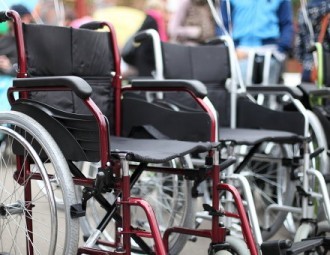Siarhei Drazdouski: Belarus’ accession to the Convention on the rights of the disabled was reverted

Intermediate results of “Sign with your heart” campaign prove that the society is ready to accept the provisions of the Convention. However, the state has been unable to see this readiness since 2008.
On the threshold of December 3 – the International Day of the Disabled - Office for the Rights of Persons with Disabilities summed up intermediate results of Sign with your heart” information campaign. The results will be sent to the House of Representatives and to the Council of the Republic of the National Assembly of the Republic of Belarus, as well as to the Ministry of Labor and Social Protection of Belarus.
The campaign was initiated by the Office for the Rights of Persons with Disabilities in early 2014. Its main idea is to provide everyone who is concerned with the problems of the disabled to state about their civic stance regarding the adoption of the Convention.
By signing the Memorandum on accession to the voluntary commitment to adhere to the principles of the Convention any citizen of the country as well as any organization made their contribution to the adoption of the document: they took upon themselves the responsibility to observe or not violate these rights. For now more than four hundred natural persons and about fifty legal persons joined the initiative.
Intermediate results are not disappointing, which cannot be said about the state’s attitude towards accession to the Convention, notes Siarhei Drazdouski, the coordinator of the "Office on the Rights of Persons with Disabilities", in the interview with the EuroBelarus Information Service.
- The campaign started in 2014 because we have waited for too long, - Siarhei Drazdouski says. – Let me recall that the discussion about the possibility of joining this campaign started as early as in 2008, and in 2009-2010 important judicial and sociological research was conducted. Throughout this time we have been watching how other countries’ access to the convention and its ratification. And our authorities have been constantly saying that we are just about to sign it, while nobody can answer what really prevents us from signing it. Our Foreign Ministry repeatedly stated that Belarus confirmed its commitment to consider accession to the Convention; however, it hasn’t happen yet.
The state has been using the same arguments, and that motivated for the start of the campaign.
Earlier the state claimed to be preparing for the Convention so that to automatically confirm its adherence to the Convention, at the same time voicing the cliché that “our society is not yet ready to sign the Convention”. We can only disprove this statement by addressing the society itself. That is why we called for the society, civil society organizations, and common citizens to give their signature and by this demonstrate their position. For now more than 400 people and about 50 organizations that include thousands of people joined the initiative. I think it is enough to understand that this document – the Convention – is needed here and now.
Autumn of 2014 didn’t add any optimist, the coordinator of the Office says.
- The campaign was under way, and in October regular Concept of integration of the disabled for the next five years was presented. And this concept doesn’t mention the Convention at all and includes provisions that are out of tune with the Convention. When we asked what is happening, the answer was “when we sign the Convention, then we’ll write a new state program”. So this autumn brought us disappointments. With all the words, rhetoric, and declarations we still see that a certain kickback is taking place. On December 3, 2014 the Ministry of Labor and Social Protection hasn’t even introduced the draft law to the Parliament, which means that the deputies weren’t informed about the need to adopt the Convention. It appears that the authorities have been drifting for so many years. As if there are no results, it only means standstill.
- However, with all that we still can find successful examples in Belarus that comply with the Convention, Siarhei Drazdouski says.
- Today the Ministry of Education is working on the concept of inclusive education. The Ministry of Architecture and Construction is working on the normative base for creating barrier-free environment. As to the other state bodies, they act traditionally rather than innovatively.
We see bigger advances at a local level rather than at the national one. We have examples when some institutions are working hard to overcome the imperfectness of today’s Belarusan legislation in terms of ability and give it back to people by turning them back to society. From the experience we see that it often happens not thanks to the law but in spite of them. However, unfortunately, all the examples don’t form a system; and now we see that the state is unwilling to look at this problem systematically.
-
03.01
-
07.10
-
22.09
-
17.08
-
12.08
-
30.09



























